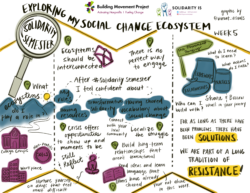Nov
11
2020
Written by Kitty Hu (Communications & Administration Intern, Fall 2020)
The Fall 2020 Solidarity Semester has officially ended, but the opportunity and need to sustain solidarity work remains. Over the course of five weeks, youth activists and leaders joined the Building Movement Project and SolidarityIs to explore social change roles, solidarity principles, and ongoing racial justice campaigns. We heard from movement leaders on the frontlines through a series of Instagram Live conversations, strengthened our social change toolkits, and solidified our commitments to solidarity as we chart a path forward.
So how do we prepare ourselves for the future? During the five IG Live conversations that took place during the Solidarity Semester, we heard from Greisa Martinez Rosas of United We Dream, Janeen Comenote of the National Urban Indian Family Coalition, Judith Browne-Dianis of the Advancement Project’s National Office, Ahmad Abuznaid of the US Campaign for Palestinian Rights, and Alex Tom of the Centered for Empowered Politics. We identified three key themes and issue areas that speak to our current socio-political moment and what we can do next. The movement for racial equity continues as we hear from some of our experts’ insights and recommendations:
How can we prepare ourselves beyond the election?
Movement building is a marathon, not a sprint. How we sustain ourselves in social change work is critical to creating long-term practices and relationships. We recognize the need for self-care and rest along this journey, and how we can shift between various roles to provide space for others to step back.
How do we sustain ourselves in social change work?
As Deepa Iyer, Director of Movement Building at BMP, consistently reminds us, solidarity is a verb, practice, and action that we do again and again to build community power. Now more than ever, we need all our communities to come together and recognize the strength we have as a coalition of activists, storytellers, healers, and visionaries.
How do we build solidarity?
Thank you to all of our students, partners, and leaders for joining us for Solidarity Semester. It is vital that we connect communities, experiences, and struggles to reach mutual liberation and collective healing. Our work continues together.
To learn more about solidarity practice, check out the Fall 2020 Solidarity Semester resources, the social change ecosystem map, and www.solidarityis.org.

